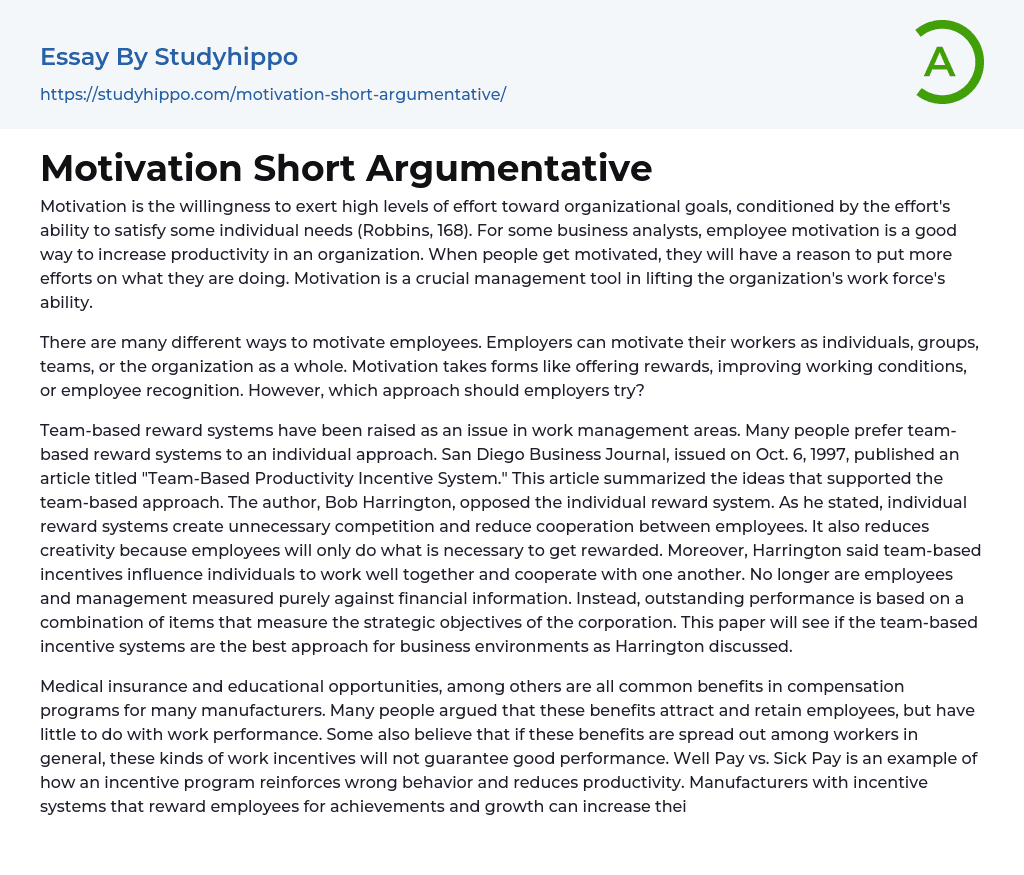Motivation, as defined by Robbins (168), refers to the willingness to exert significant effort in order to achieve organizational goals. It is driven by the desire to fulfill individual needs. Business analysts widely believe that employee motivation can effectively enhance productivity in an organization.
When individuals are motivated, they become more dedicated to their tasks, leading to increased efforts. Motivation is a vital tool for management to enhance the capability of the workforce in an organization. There are various methods to motivate employees, including focusing on individuals, groups, teams, or the entire organization. Motivation can be in the form of providing rewards, enhancing working conditions, or acknowledging employees.
Employers are unsure which approach to try: team-based or individual, in work management areas where the use of team-based reward systems has been brought up as a topic of discussion. Many individuals prefer team-based reward systems over the individual
...approach. The San Diego Business Journal published an article titled "Team-Based Productivity Incentive System" on October 6, 1997, presenting ideas that support the team-based approach. The author, Bob Harrington, was against the individual reward system and argued that it fosters unnecessary competition and hinders cooperation among employees.
Harrington discusses the implementation of team-based incentives in the workplace and highlights their potential positive and negative effects. One advantage is that they promote collaboration among employees, enhancing teamwork. Conversely, these incentives may hinder creativity as employees prioritize tasks solely for the sake of earning rewards. Furthermore, by incorporating a broader range of criteria aligned with the corporation's strategic objectives, these incentives broaden the focus beyond financial results. This paper evaluates Harrington's discussion on whether team-based incentive systems are suitable for different business environments.
Medica
insurance and educational opportunities are commonly provided as compensation benefits in manufacturing industries. While these benefits are believed to help attract and retain employees, their impact on work performance is questioned. It is argued that offering these benefits to all workers may not necessarily lead to improved performance, as it can unintentionally reinforce negative behavior and reduce productivity.
In today's global market, manufacturers can enhance their competitiveness and profitability by implementing incentive systems that reward employees for their achievements and growth. It is essential for organizations to have incentive systems to satisfy their workforce, and team-based incentive systems like gain sharing and profit sharing are gaining popularity in work environments. Collaboration and mutual support among employees are crucial in achieving objectives, as individuals are now expected to work as a team.
Your work is my work, and your responsibility is mine. People will become more cohesive when working in a group or team. Team-based incentives offer several advantages. However, I disagree with Harrington that individual incentive systems have no positive influence on workers' performance. Some individuals are highly successful when they work independently.
People raised in an individualistic culture may not benefit from group work. Therefore, individual incentive systems are important for increasing productivity, provided employers know how to effectively use this reinforcement system. If organizations establish a standard for measuring individual achievement and reward individuals based on their performance, individual incentive systems can be just as effective as team-based systems. Additionally, managers should be aware that team-based incentive systems can lead to the Social Loafing effect - the tendency for individuals to exert less effort when working collectively compared to working individually (Robbins, 260).
Motivations are essential
in the workplace to enhance workforce productivity. It is crucial for reward systems to create mutual benefits for both employees and employers. While team-based incentive systems are widely favored in today's work market and often yield positive results, there are cases where individual incentive systems should be adopted by managers, especially when employees possess higher skill levels and exhibit greater efficiency and effectiveness while working individually. The primary aim of the incentive system is to inspire and organize employees.
Bibliography:
- Alonzo, Vincent. "Only The Scared Survive." Sales and Marketing Management. January 1998, v150 n1 p28(2).
- Barnard, Janet. "The Workplace Environment." Industry Management. September 1997, v39 n5 p14(3).
- Harrington, Bob. "Team-Based Productivity Incentive System." San Diego Business Journal. October 6, 1997,
v18 n40 p10(1). - Hertzog, Karla.
"Motivate Your Staff With Time-Related Benefits." San Diego Business Journal. October 6, 1997, v18 n40 p17(1).
- Jeski, Deane. "Searching for Recruits." Management Magazine. July 1995, v70 n7 p14(2).
- Robbins, Stephen.
Organizational Behavior. New Jersey 1998.
April 20, 1997, p420B112.
- American Dream essays
- Barriers To Entry essays
- Capitalism essays
- Central Bank essays
- Compensation essays
- Consumerism essays
- Economic Development essays
- Economic Growth essays
- Economic Inequality essays
- Economic System essays
- Economy essays
- Employment essays
- Export essays
- Finance essays
- Free Trade essays
- Gross Domestic Product essays
- Human Development essays
- Income Inequality essays
- Industry essays
- Inflation essays
- International Business essays
- International Trade essays
- Macroeconomics essays
- Materialism essays
- Max Weber essays
- Microeconomics essays
- Minimum Wage essays
- Monetary Policy essays
- Monopoly essays
- Pricing essays
- Profit essays
- Recession essays
- resources essays
- Taxation essays
- Trade essays
- Unemployment essays
- Warehouse essays
- World economy essays
- Incentive essays
- Bias essays
- Big Five Personality Traits essays
- Body Image essays
- Mind essays
- Motivation essays
- Phobias essays
- Thought essays




